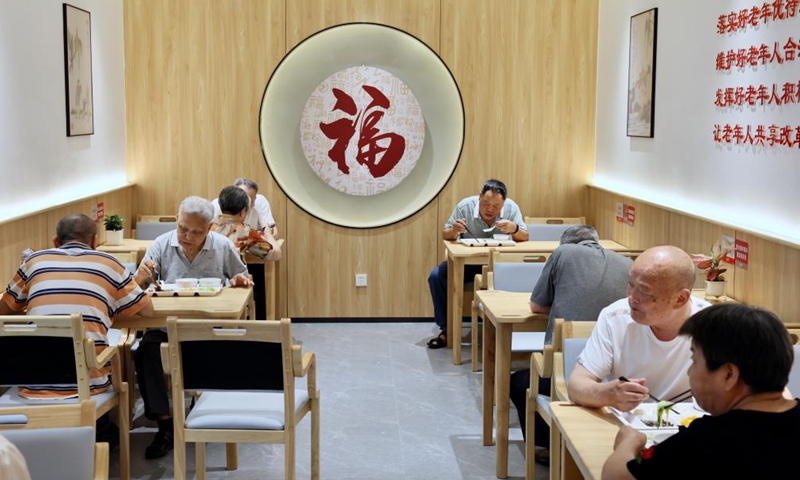
Senior citizens have meals at a canteen for elderly people at a community in Jin'an District of Fuzhou, capital of southeast China's Fujian Province. File Photo:Xinhua
With the continuous aging of China's population, how to ensure care for elderly people and improve elderly people's lives has become a topic that has drawn increasing attention from the public. Sun Jie, a member of the 14th National Committee of the Chinese People's Political Consultative Conference (CPPCC), told the Global Times that in addition to the basic endowment insurance, China should encourage the expansion of the supply of commercial pension financial products and promote the high-quality development of the "multi-pillar pension system."
She also suggested that young people plan for their elderly care "as early as possible."
China's pension system is a three-pillar model, consisting of a basic old-age pension, with the number of insured people exceeding 1 billion. The second pillar includes enterprise annuities and occupational annuities, which are jointly contributed by employers and employees, while the state provides policy support. The third pillar includes individual pension plans and other individual commercial pension financial services.
Sun, who is also vice dean and professor of the School of Insurance at the University of International Business and Economics, told the Global Times that in practice, the first pillar of China's basic endowment insurance has wide coverage. However, due to the significant gap between the life expectancy when the policy was formulated and the current actual average life expectancy in China, there is a relatively large actual and potential gap in the basic endowment insurance.
The coverage rate of the second pillar is low, and the third pillar just started recently. "As a result, currently, the pension pressure and risks in China are mainly borne by the first pillar, that is, the government," said Sun.
As China's average life expectancy continues to rise, relying solely on the first pillar of the basic endowment insurance system is no longer sufficient, according to Sun. She suggested that China expedite efforts to promote the development of a multi-pillar pension framework and broaden the sources of pension funds. Notably, it is crucial to encourage commercial insurance companies to innovate and offer a greater variety of individual pension products featuring long-term security and lifetime payouts.
Sun pointed out that at present, many commercial insurance companies are reluctant to introduce commercial endowment insurance products offering lifetime payouts, largely because of concerns over "longevity risk." This refers to the financial peril in pension disbursements that insurance companies bear when people's actual lifespans surpass the projected ones.
To tackle this practical problem, she proposed the expeditious formulation of a set of standard, market-based mortality or survival rate indices. Such indices would serve as the foundation for the rational pricing of longevity-risk securitization products. Simultaneously, in tandem with the capital market, through mechanisms such as longevity-risk reinsurance and financial derivatives, longevity risk can be spread and shifted to a broader spectrum of investors. This, in turn, would resolve the operational risks faced by commercial insurance companies and other entities.
For ordinary people, the first-pillar basic endowment insurance is designed to meet the most fundamental living needs after retirement. If one desires to maintain a more affluent retirement life, it is essential to plan and design for old-age care in advance, said Sun.
"Not long ago, some experts proposed that starting to plan for retirement at the age of 35 might even be a bit late, and I myself highly agree with this view," she said. "As people are living longer and longer, the overall demand for pensions is actually increasing. Relying solely on basic endowment insurance cannot meet all future needs."
For young people, Sun also said they should pay attention to retirement planning at an early stage. "People's lifespans often extend beyond their own expectations," she said. "My advice is that on the very first day you start working, you can set aside the cost of a cup of coffee every day (for retirement)," Sun noted.




